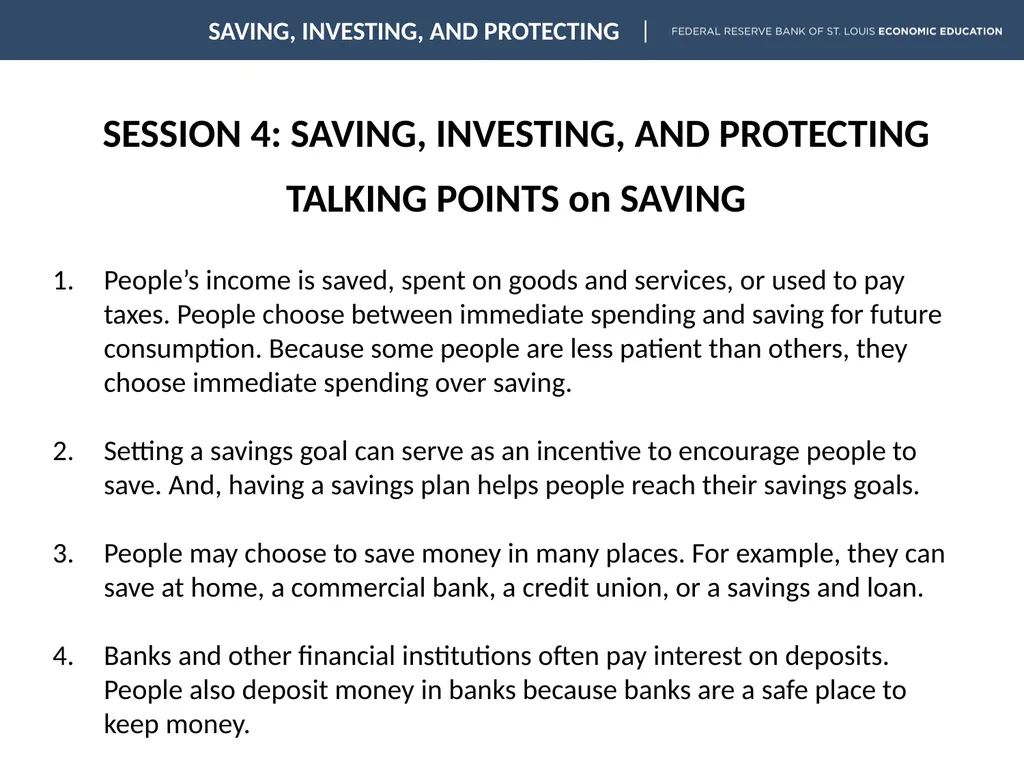SESSION 4: SAVING, INVESTING, AND PROTECTING
Author : yoshiko-marsland | Published Date : 2025-06-23
Description: SESSION 4 SAVING INVESTING AND PROTECTING TALKING POINTS on SAVING SAVING INVESTING AND PROTECTING Peoples income is saved spent on goods and services or used to pay taxes People choose between immediate spending and saving for
Presentation Embed Code
Download Presentation
Download
Presentation The PPT/PDF document
"SESSION 4: SAVING, INVESTING, AND PROTECTING" is the property of its rightful owner.
Permission is granted to download and print the materials on this website for personal, non-commercial use only,
and to display it on your personal computer provided you do not modify the materials and that you retain all
copyright notices contained in the materials. By downloading content from our website, you accept the terms of
this agreement.
Transcript:SESSION 4: SAVING, INVESTING, AND PROTECTING:
SESSION 4: SAVING, INVESTING, AND PROTECTING TALKING POINTS on SAVING SAVING, INVESTING, AND PROTECTING People’s income is saved, spent on goods and services, or used to pay taxes. People choose between immediate spending and saving for future consumption. Because some people are less patient than others, they choose immediate spending over saving. Setting a savings goal can serve as an incentive to encourage people to save. And, having a savings plan helps people reach their savings goals. People may choose to save money in many places. For example, they can save at home, a commercial bank, a credit union, or a savings and loan. Banks and other financial institutions often pay interest on deposits. People also deposit money in banks because banks are a safe place to keep money. SESSION 4: SAVING, INVESTING, AND PROTECTING TALKING POINTS on SAVING SAVING, INVESTING, AND PROTECTING Banks and other financial institutions loan money they receive from depositors (deposits) to borrowers. Banks charge borrowers interest for the loans. Part of the money received as interest from these loans is used to pay interest to depositors for the use of their money. An interest rate is usually expressed as an annual percentage of the amount saved. The interest rate paid on savings and charged on loans, like all prices, is determined in a market. When interest rates increase, people earn more on their savings and their savings grow more quickly. Principal is the initial amount of money deposited on which interest is paid. Compound interest is the interest that is earned on the principal and the interest already earned. SESSION 4: SAVING, INVESTING, AND PROTECTING TALKING POINTS on SAVING SAVING, INVESTING, AND PROTECTING The value of a person’s savings in the future is determined by the amount saved and the interest rate. The earlier people begin to save, the more savings they will be able to accumulate (all other things equal) as a result of compound interest. People save money for different reasons, including higher education, retirement, unexpected events, and large purchases such as cars and homes. To assure savers that their deposits are safe from bank failures, federal agencies guarantee depositors’ savings in most commercial banks and savings associations up to a set limit. SESSION 4: SAVING, INVESTING, AND PROTECTING TALKING POINTS on SAVING SAVING, INVESTING, AND PROTECTING The interest rate that banks quote is the nominal, or stated, interest rate. The real interest














